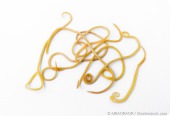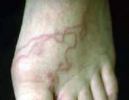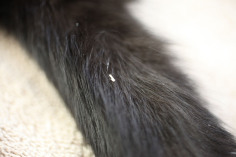Parasite Control
Several common intestinal parasites affect cats and dogs. Most of them cause diarrhea. Other signs may include bloody diarrhea, weight loss, itchiness near the anus, or vomiting.
Most worms and parasites are never seen. Once they find the right spot in the body, they don't want to leave. Therefore, you rarely see "worms in the poop". The test we perform of the fecal sample looks for microscopic eggs.
Roundworms: These worms attach to the small intestines and steal nutrients. They are long and thin, resembling spaghetti. Puppies are actually born with this parasite. Kittens get the worm shortly after birth through their mother's milk. Adults get roundworms through their environment, usually by eating the eggs or infected prey. Humans can also be affected by this parasite so it is important to detect early and treat your pet. All puppies and kittens should be treated for roundworms.
Hookworms: These parasites also attach to the intestines but they feed on blood. Dogs and cats are infected with this parasite through their mothers, by eating the eggs in the environment, eating prey, or an immature stage that can migrate through the skin. This worm can also affect humans. These worms are very thin and you won't see them in the stool. All puppies and kittens should be treated for hookworms.
Whipworms: This long worm attaches to the large intestines and feeds on blood and tissue. Dogs are infected by eating the eggs in the environment. Cats do not get this parasite. Your dog may experience diarrhea, often with blood or mucous. Humans rarely become infected.
Tapeworms: This long, segmented worm lives in the intestines and steals nutrients. Cats and dogs can become infected with tapeworms by eating fleas or by eating small rodents or rabbits. Diagnosis is usually made by seeing the rice-like segments around the anus or on the stool.
Coccidia: This parasite is not a worm but rather a one-celled organism. They develop in the intestinal wall and cause damage leading to diarrhea. Cats and dogs are both affected by this parasite. Coccidia are species-specific meaning that each species has its own version and won't be infected by another version. In other words, cats cannot get it from rodents; humans cannot get it from dogs.
Giardia: This is another one-celled parasite that is not a worm. They also develop in the intestinal wall and cause damage. They can cause diarrhea but most of the time, there are no clinical signs. Cats and dogs are infected by ingestion of the parasite from the environment, usually from contaminated fecal material. The type of Giardia in dogs and cats does not infect humans.
Fecal screenings every 6 to 12 months allows us to find these parasites. The test looks for eggs in the stool (or the organism itself in the case of Coccidia and Giardia). This is not always accurate because not all parasites shed eggs all the time. For example, whipworms have a "quiet" period where they do not shed eggs for 3 months. It's also possible to have only male worms so no eggs are made. When your pet has diarrhea, the intestines may be "washed out" and eggs aren't in the sample we have for testing.
This is why it is important to test frequently. If the doctor believes parasites may be causing your pet to be sick, she will often simply give your pet medicine even if the stool test didn't show anything. Puppies and kittens should be treated several times as they are growing.
Most parasites are difficult to prevent in the environment because they are extremely hardy. The best thing to do is clean up stool promptly. A dilute bleach solution won't kill eggs but removes a sticky coating on roundworm eggs making them easier to clean up. Use this in the house when your puppy has accidents.










